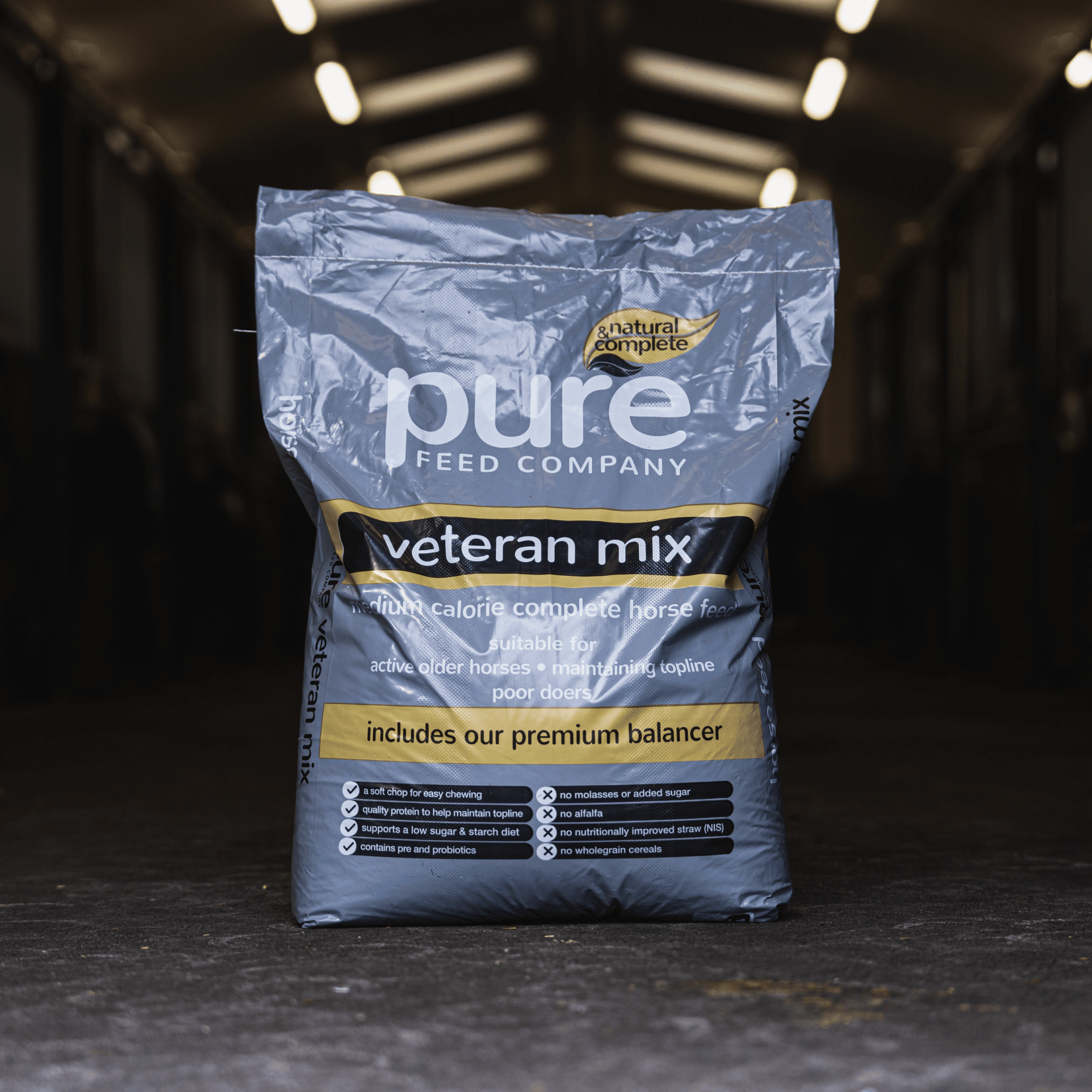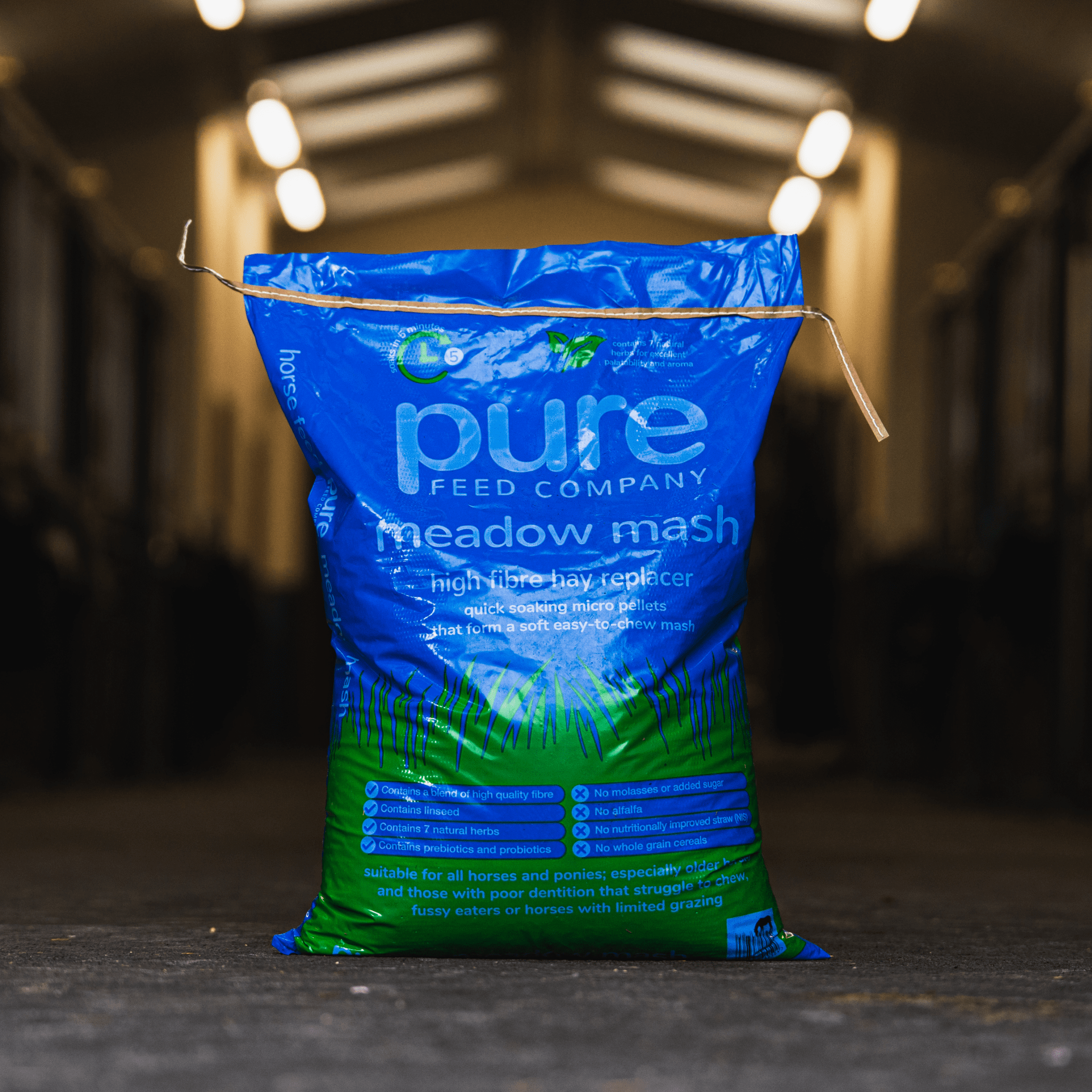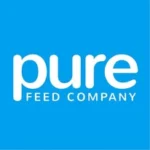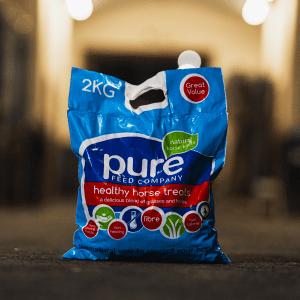FEED ADVICE – HEALTH
Understanding Tying Up in horses
Tying Up, also known as exertional rhabdomyolysis is the most common muscle disorder seen in horses resulting in muscle damage and poor performance. Tying up is primarily seen in sport horses where episodes can range from mild muscle cramps to severe muscle breakdown and damage. Although distressing, tying up can be managed effectively through diet and routine.
Key Highlights

Tying up is also known as exertionalrhabdomyolysis, Monday Morning Disease, and azoturia.
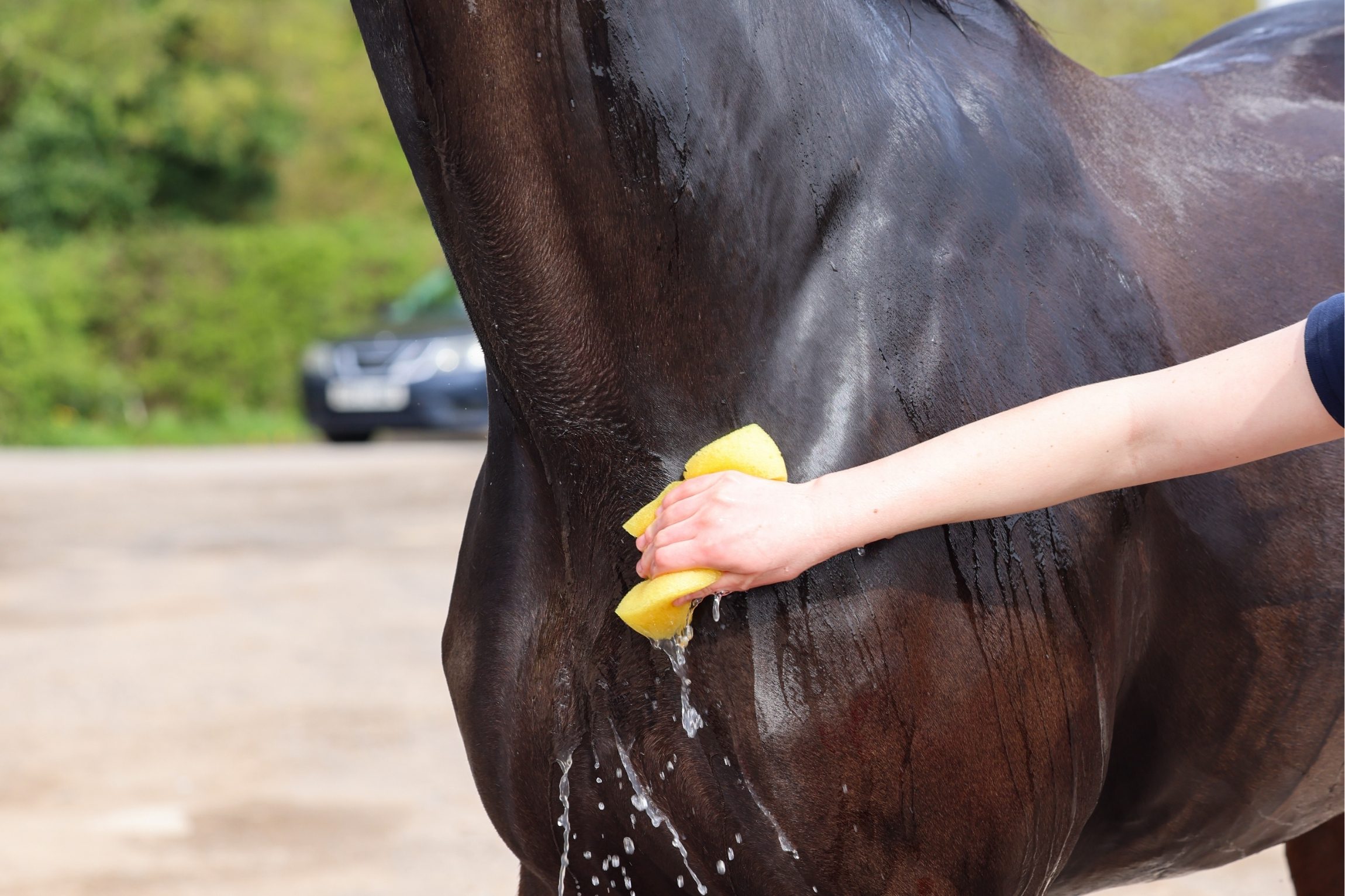
It is characterised by muscle damage and the resulting in pain, spasms and stiffness.
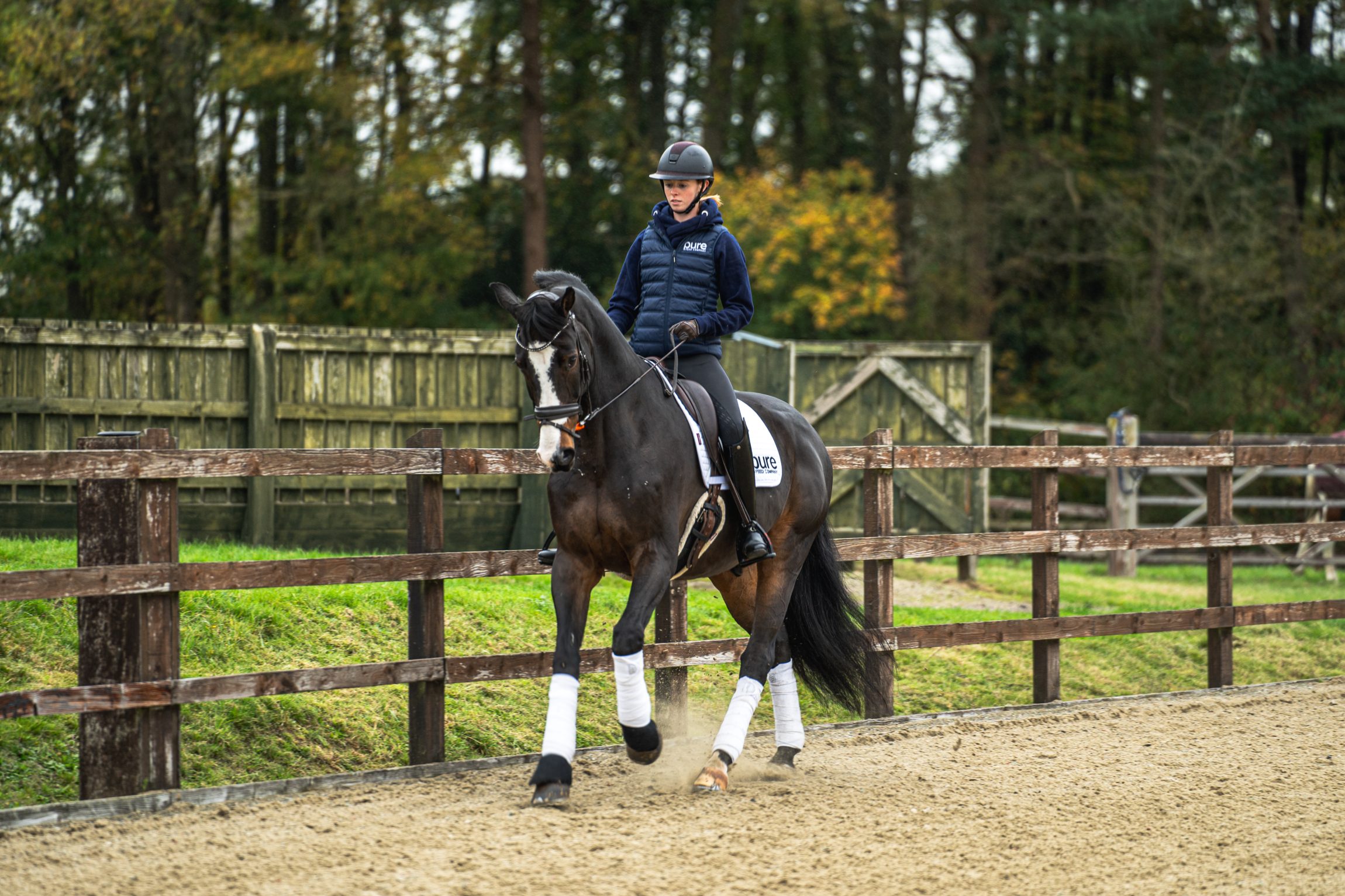
Genetic factors, dietary imbalances, and overtaining are some of the causes behind tying up in horses.

Immediate actions during an episode of tying up include pain relief, muscle relaxtion and blood tests.
Understanding Tying Up
Tying Up is essentially extreme muscle cramping. It is characterized by muscle damage and the breakdown of muscle cells, leading to the release of muscle enzymes into the bloodstream. This condition is often triggered by intense exercise or exertion beyond the horse’s training level. The excessive strain on the muscles can result in muscle pain, stiffness, and lameness.
Tying Up arises from a combination of genetic predispositions, environmental triggers, and management factors, including:
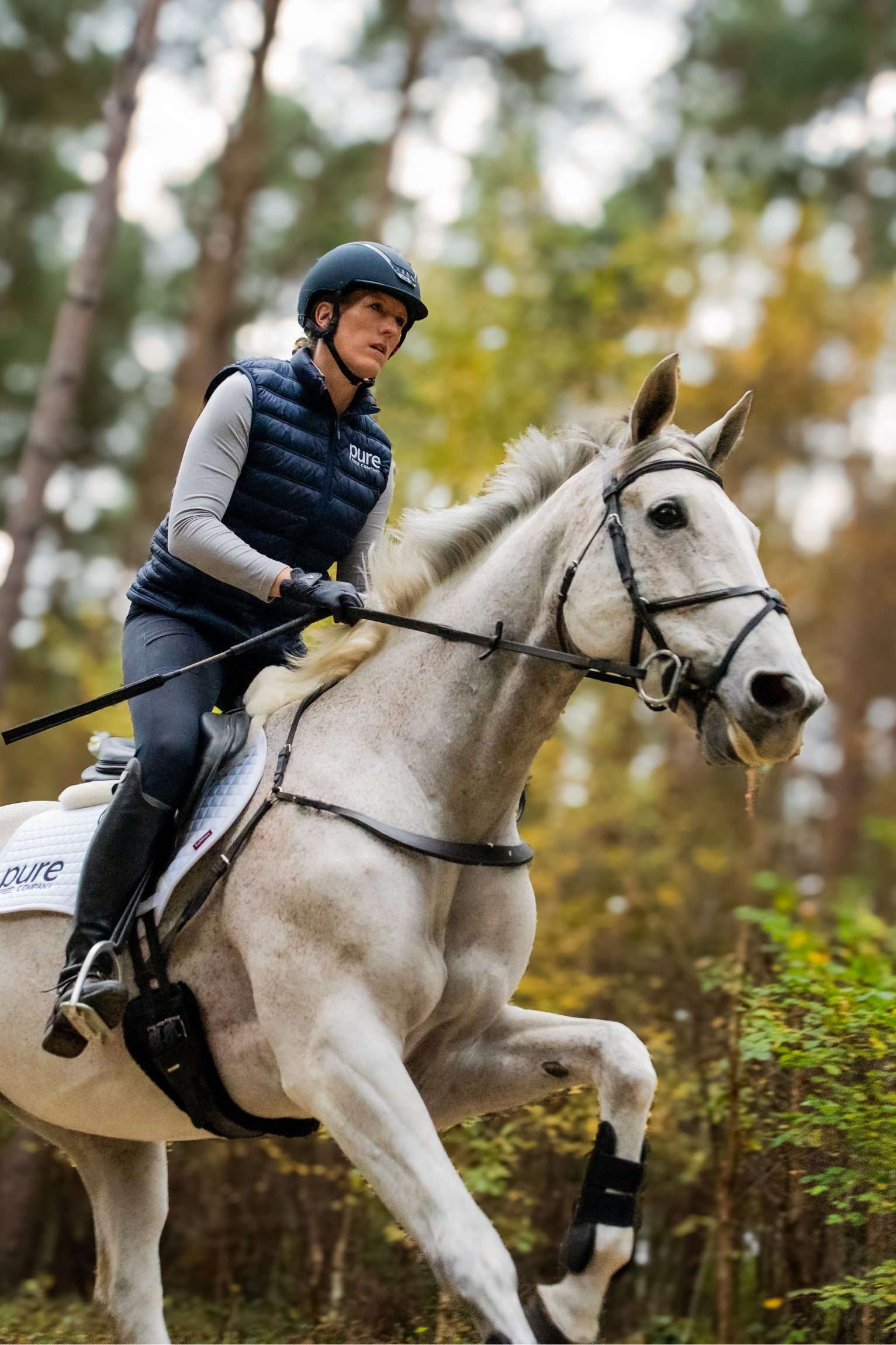

Recognising clinical signs of Tying Up
Recognising the signs of Tying Up is essential for prompt intervention and management, as early recognition may improve outcomes and minimize long-term complications:
Diagnosis of Tying Up
Diagnosis of tying up in horses involves several diagnostic approaches. Veterinary examination focuses on observing clinical signs such as muscle stiffness, pain, gait abnormalities, sweating, and any history of previous tying up episodes after exercise. A detailed history is essential, covering the horse’s exercise routine, diet, management practices, and past episodes of tying up.
Blood tests are crucial, measuring muscle enzymes like creatine kinase (CK) and aspartate aminotransferase (AST) to detect muscle damage, typical in tying up cases. Interpreting enzyme levels can be challenging, as even asymptomatic horses may show elevated levels post-exercise. Horses with chronic tying up may exhibit persistently high CK and AST levels at rest.
Urinalysis reviews the myoglobin content in the urine, which if found, indicates severe muscle damage. A muscle biopsy may be necessary in severe or recurrent cases, examining muscle tissue for damage or abnormalities under a microscope. Measuring electrolyte excretion (sodium, potassium, calcium, phosphorus, chloride) can identify horses with abnormal electrolyte absorption. It’s crucial to collect samples when the horse is stable and consuming its normal diet.
To ensure an accurate diagnosis, other potential causes of muscle pain and stiffness, such as lameness or neurological issues, are ruled out through comprehensive clinical examination and diagnostic tests.
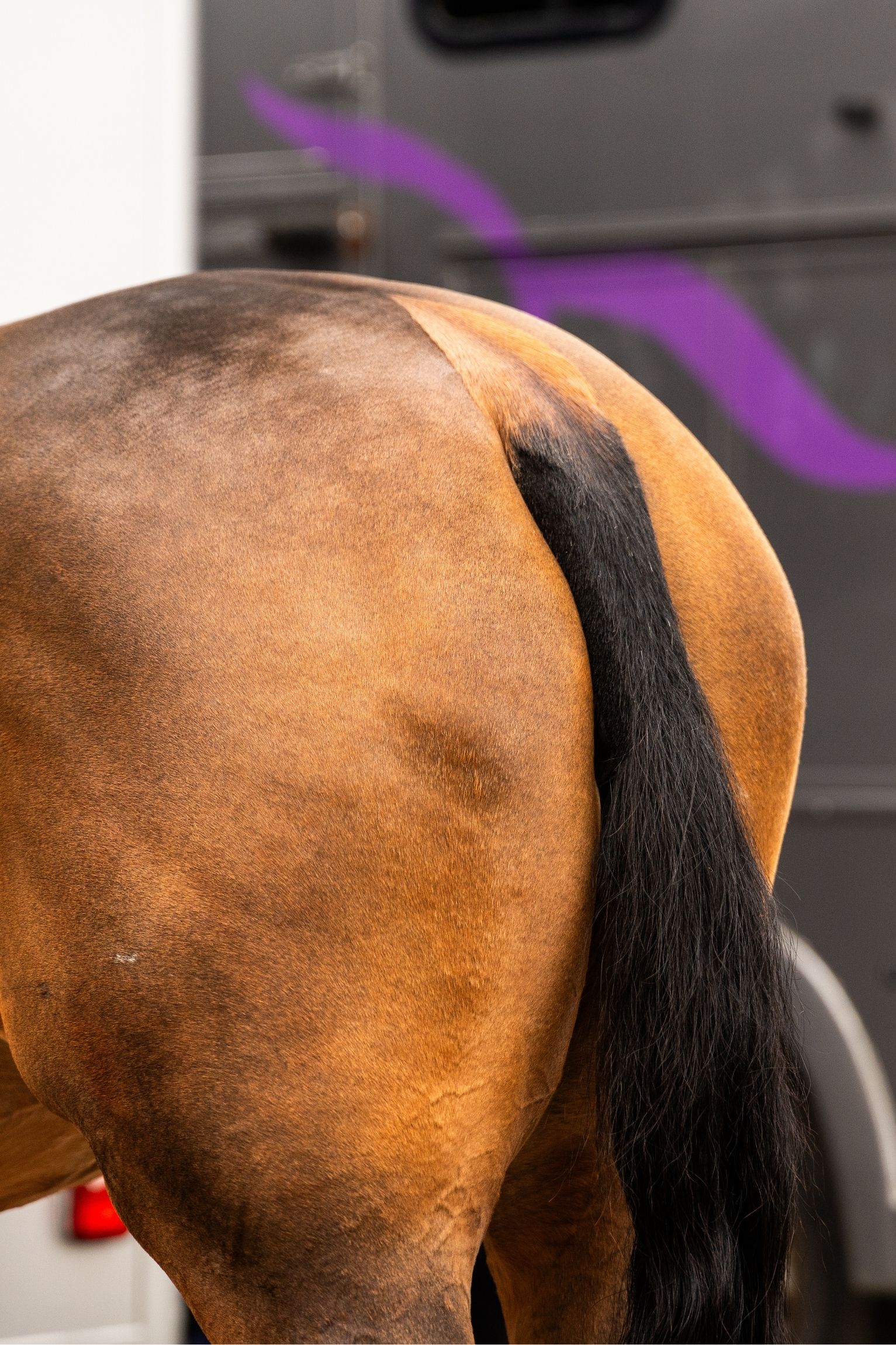
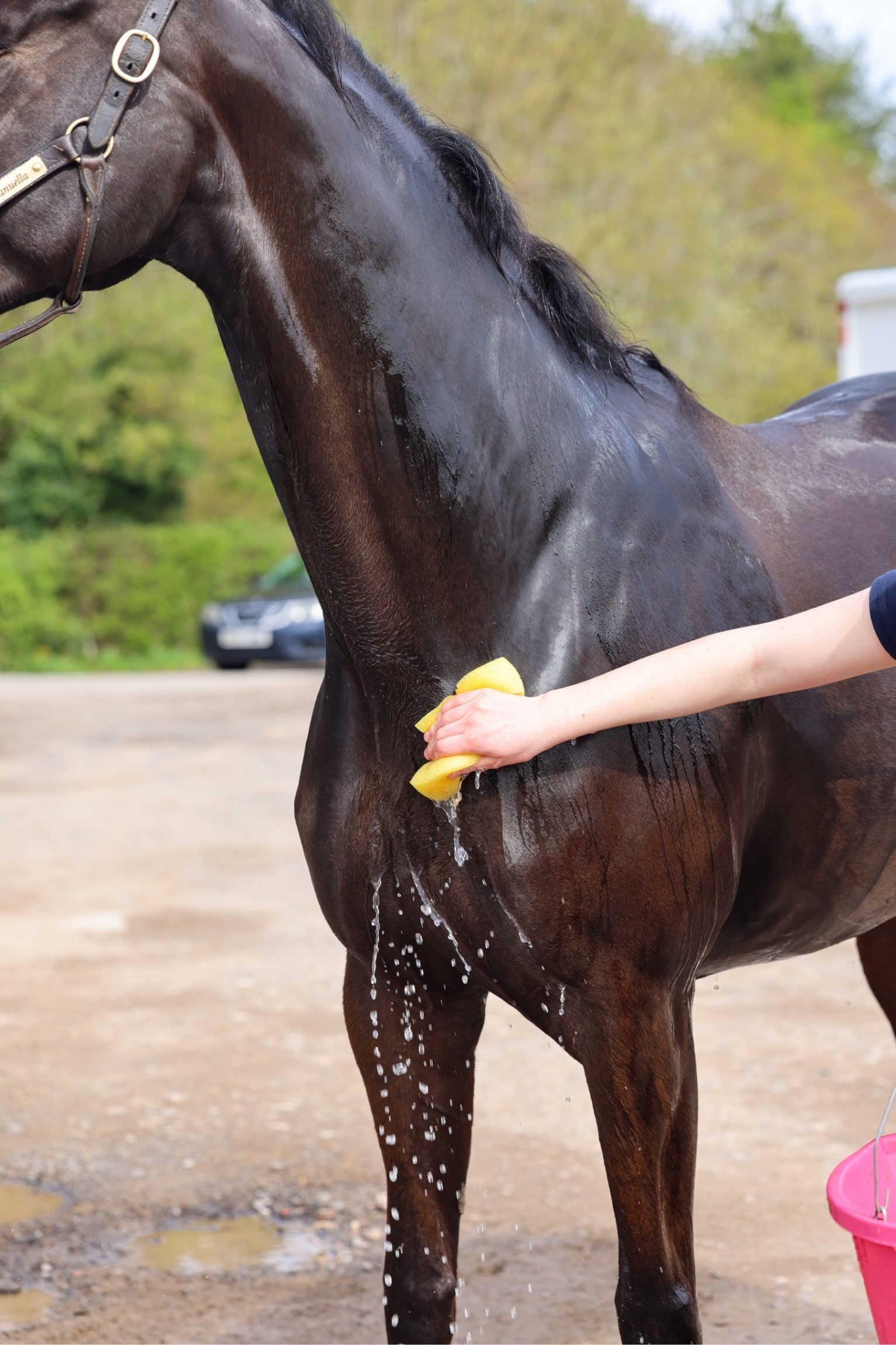
Treating a Horse with Tying Up
Treatment for a horse that has experienced tying up focuses on relieving muscle pain and inflammation and promoting muscle recovery. If your horse ties up the following steps should be followed:
Move the horse to a stable – do not make the horse travel far as tying up in an incredibly painful condition and excessive movement can exacerbate the condition
If the horse is warm apply cold water or cold packs to affected muscle groups to reduce inflammation and alleviate pain. If it is colder weather, place a rug on the horse to avoid the need to shiver. Avoid excessive rubbing or massaging, which can further irritate muscles.
Once the vet arrives, they might:
- Offer Pain Relief: Non-steroidal anti-inflammatory drugs (NSAIDs), such as phenylbutazone (bute) or flunixin meglumine (Banamine), may be administered to relieve pain and reduce inflammation.
- Provide Fluid Therapy: Intravenous fluids may be necessary to maintain hydration and support kidney function, especially if myoglobinuria (dark urine) indicates significant muscle damage.
- Offer Sedation: drugs such as Acepromazine and xylazine can be offered to alleviate acute pain and discomfort. These medications help relax tense muscles, reducing spasms and stiffness that contribute to the horse’s pain
Management and Prevention Strategies
Effective management and prevention strategies can help minimise the occurrence of tying up in horses and promote overall muscle health.
Long-term dietary adjustments, developing a sustainable exercise routine, avoiding overtraining, and implementing stress management techniques are crucial for preventing episodes of tying up.
Dietary Adjustments:
Balanced Diet: Providing a balanced diet rich in high-quality forage, appropriate levels of energy, protein, vitamins, and minerals supports overall health, muscle function, and athletic performance in horses prone to ER.
Supplemental Vitamin E and Selenium: Supplementation with vitamin E and selenium, either through balanced feeds, mineral supplements, or oral supplements, helps support antioxidant defences, protect against oxidative stress, and reduce the risk of muscle damage associated with ER.
Did you know our ReFuel contains vitamin E and Selenium? Ideal for helping support your horse’s muscles.
Amino Acid Supplementation: Essential amino acids, such as lysine, methionine, and branched-chain amino acids (BCAAs), play critical roles in muscle protein synthesis, repair, and recovery, making them valuable additions to the diets of horses prone to ER.
Did you know all our complete feeds contain lysine and methionine?
Electrolyte Balance: Maintaining electrolyte balance through appropriate supplementation, particularly during periods of increased sweating or intense exercise, helps support muscle function, hydration, and acid-base balance, reducing the risk of muscle cramping and fatigue associated with ER.
Did you know that regular electrolyte supplements can be abrasive to the digestive system and companies must add a lot of sugar to make them palatable? That is why our Pure Electrolytes are fat coated, to make sure they are more bioavailable to the horse and kinder on the digestive system.
Omega-3 Fatty Acids: Supplementation with omega-3 fatty acids, derived from sources such as fish oil or linseed oil, may help modulate inflammatory responses, support cardiovascular health, and enhance muscle recovery in horses prone to ER.
Did you know all our feeds contain micronized linseed? We even sell Pure Linseed for horses that require a little bit extra!
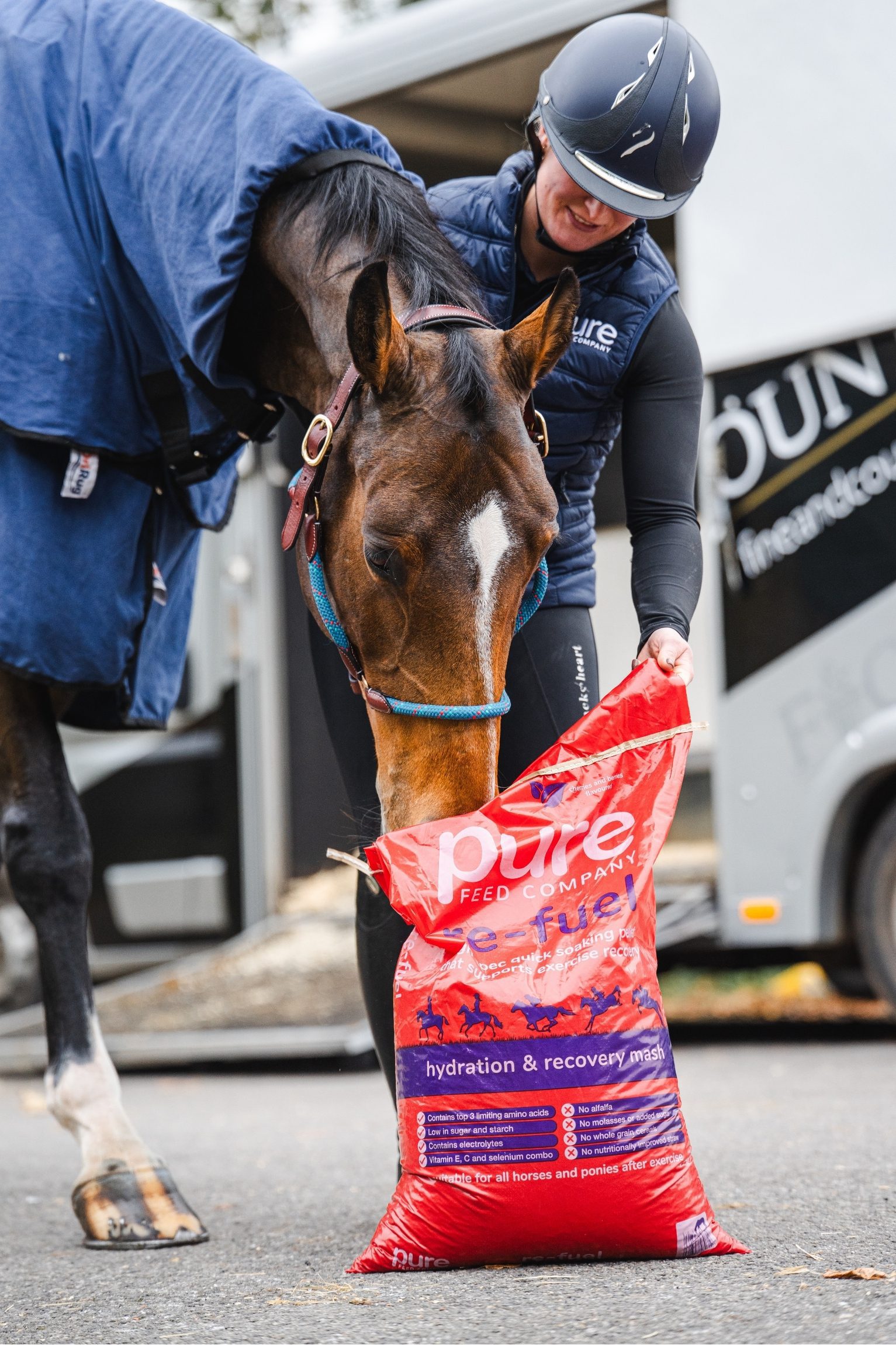

Developing a Sustainable Routine
Developing a sustainable exercise routine is crucial in managing and preventing tying up in horses. Strenuous exercise without proper conditioning and rest periods can increase the risk of muscle damage and tying up.
Start with low-intensity activities such as walking and light trotting, gradually increasing the duration and intensity of workouts as the horse’s fitness improves. Avoid sudden, intense exercise sessions, as these can trigger episodes of tying up. Additionally, ensure the horse has adequate warm-up and cool-down periods to promote muscle flexibility and circulation. Incorporate rest days and monitor the horse’s response to exercise closely, adjusting the program as needed. Providing a balanced diet with sufficient electrolytes and ensuring proper hydration can also help manage the condition.
Horses prone to tying up benefit from a regular, consistent exercise routine, but this does not necessarily mean they should work daily from a regular, consistent exercise routine, but this does not necessarily mean they should work every day. Daily exercise can help maintain muscle function and prevent episodes of tying up by promoting steady muscle metabolism and preventing the buildup of lactic acid. However, the intensity and duration of exercise should be carefully managed. Incorporate rest days or very light activity days to allow the horse’s muscles to recover. This is especially important if the horse shows any signs of stiffness or discomfort.
Conclusion
In conclusion, understanding why horses tie up is crucial for their well-being. From recognising the signs to implementing management and prevention strategies. Genetic factors, dietary imbalances, and overtraining play significant roles in this condition. By taking immediate actions, making dietary adjustments, and managing stress, you can help minimise the risk.
Featured products to help with Tying Up
Made in the UK
We are proud to say that all of our feeds are produced here in the UK
FREE Shipping
We offer FREE SHIPPING for all orders in the UK with 15 bags and over*
Sustainable
We are dedicated to playing our part in making the world more sustainable

100% Natural
We use high-quality ingredients and no unnecessary additives.
Thousands of people love our feeds
Did you know that all of our complete feeds contain Vitamin A? 🧬
Essential for your horse’s health, vitamin A supports:
👀 Vision
🛡️ Immune system
✨ Skin, coat & mucous membranes
📈 Growth & reproduction
Even with good forage, intake can vary, our complete feeds provide consistent, bioavailable vitamin A every day.
💬 Questions about vitamins in your feed? Drop them below!

Did you know that all of our complete feeds contain Vitamin A? 🧬
Essential for your horse’s health, vitamin A supports:
👀 Vision
🛡️ Immune system
✨ Skin, coat & mucous membranes
📈 Growth & reproduction
Even with good forage, intake can vary, our complete feeds provide consistent, bioavailable vitamin A every day.
💬 Questions about vitamins in your feed? Drop them below!
Forget juggling powders, syrups, and electrolytes after every ride; Refuel makes recovery simple and effective in one complete feed.
Here’s what it does:
🔹 Replenishes electrolytes lost in sweat to support hydration and muscle function
🔹 Supports muscle repair with high-quality, digestible protein
🔹 Packed with antioxidants to reduce oxidative stress and speed recovery
Tap the link in bio to learn more about Refuel today!

Forget juggling powders, syrups, and electrolytes after every ride; Refuel makes recovery simple and effective in one complete feed.
Here’s what it does:
🔹 Replenishes electrolytes lost in sweat to support hydration and muscle function
🔹 Supports muscle repair with high-quality, digestible protein
🔹 Packed with antioxidants to reduce oxidative stress and speed recovery
Tap the link in bio to learn more about Refuel today!
🧬 Protein isn’t just protein 👉 it’s what builds muscle, improves topline & fuels recovery.
🔹Low levels of limiting amino acids like lysine, methionine & threonine can slow muscle repair
🔹 Highly digestible plant proteins fuel growth without overloading the gut
🔹 Optimised blends minimise metabolic stress and maximise efficiency
👉 Tap the link in bio to see how Pure Feed fuels performance at the molecular level 🐴💪

🧬 Protein isn’t just protein 👉 it’s what builds muscle, improves topline & fuels recovery.
🔹Low levels of limiting amino acids like lysine, methionine & threonine can slow muscle repair
🔹 Highly digestible plant proteins fuel growth without overloading the gut
🔹 Optimised blends minimise metabolic stress and maximise efficiency
👉 Tap the link in bio to see how Pure Feed fuels performance at the molecular level 🐴💪
BCS 101 with Meg & Jam 🐴💪 Watch as we give a quick body condition score check and show you how to keep your horse in tip top shape!
With @horseandcountrytv, we’re excited to help Meg reach the top 🏆
#thepurefeedcompany #purefeed #purefeeddietplan #equinenutrition

BCS 101 with Meg & Jam 🐴💪 Watch as we give a quick body condition score check and show you how to keep your horse in tip top shape!
With @horseandcountrytv, we’re excited to help Meg reach the top 🏆
#thepurefeedcompany #purefeed #purefeeddietplan #equinenutrition
🌾 Did you know our complete feeds contain grass chaff?
It’s not just there for bulk, it’s science-backed fibre that actively supports your horse’s digestive:
🧪 Digestible fibre (NDF) keeps the gut moving efficiently, supporting normal hindgut function.
🧬 Encourages chewing and saliva production, which helps buffer stomach acid and protect the stomach lining.
🦠 Fuels the hindgut microbiome, feeding beneficial bacteria for better fermentation and nutrient absorption.
Including grass chaff means your horse gets consistent, functional fibre every day, even when hay quality or availability varies.

🌾 Did you know our complete feeds contain grass chaff?
It’s not just there for bulk, it’s science-backed fibre that actively supports your horse’s digestive:
🧪 Digestible fibre (NDF) keeps the gut moving efficiently, supporting normal hindgut function.
🧬 Encourages chewing and saliva production, which helps buffer stomach acid and protect the stomach lining.
🦠 Fuels the hindgut microbiome, feeding beneficial bacteria for better fermentation and nutrient absorption.
Including grass chaff means your horse gets consistent, functional fibre every day, even when hay quality or availability varies.
Pure Condition Mix supports steady condition gain, using fibre and oil-based energy that fuels the body without over-exciting it.
🌱 Unmolassed sugar beet
Digestible fibre to help add condition and support the gut, no added sugar spikes.
🌰 Linseed
Supports muscle development, topline and coat condition with quality protein and oil.
💧 Rapeseed oil
Cool, calorie-dense energy to help increase condition efficiently.
⚖️ Non-fizz formula
Slow-release energy, ideal for horses that don’t cope with cereal-heavy feeds.
👉 Perfect for poor doers, horses needing topline support or those in hard work

Pure Condition Mix supports steady condition gain, using fibre and oil-based energy that fuels the body without over-exciting it.
🌱 Unmolassed sugar beet
Digestible fibre to help add condition and support the gut, no added sugar spikes.
🌰 Linseed
Supports muscle development, topline and coat condition with quality protein and oil.
💧 Rapeseed oil
Cool, calorie-dense energy to help increase condition efficiently.
⚖️ Non-fizz formula
Slow-release energy, ideal for horses that don’t cope with cereal-heavy feeds.
👉 Perfect for poor doers, horses needing topline support or those in hard work
What’s really happening inside your horse after exercise?
Work doesn’t just burn energy. It causes
👉 electrolyte loss through sweat
👉 oxidative stress in muscle cells
👉 micro-damage to muscle fibres that must be repaired
That’s why post-exercise recovery nutrition matters 👇
⚡ Electrolytes
Sweat removes sodium, potassium and chloride. Replacing them supports hydration, muscle contraction and nerve signalling; essential for proper recovery.
🧬 Antioxidants
Exercise increases free radicals. Antioxidants help neutralise these, supporting muscles and reducing post-work fatigue.
💪 Limiting amino acids
These are the critical building blocks for muscle repair. Without them, recovery and muscle adaptation are compromised, even if protein intake looks “adequate”.
What you feed after work influences how your horse feels tomorrow, next week and next season.

What’s really happening inside your horse after exercise?
Work doesn’t just burn energy. It causes
👉 electrolyte loss through sweat
👉 oxidative stress in muscle cells
👉 micro-damage to muscle fibres that must be repaired
That’s why post-exercise recovery nutrition matters 👇
⚡ Electrolytes
Sweat removes sodium, potassium and chloride. Replacing them supports hydration, muscle contraction and nerve signalling; essential for proper recovery.
🧬 Antioxidants
Exercise increases free radicals. Antioxidants help neutralise these, supporting muscles and reducing post-work fatigue.
💪 Limiting amino acids
These are the critical building blocks for muscle repair. Without them, recovery and muscle adaptation are compromised, even if protein intake looks “adequate”.
What you feed after work influences how your horse feels tomorrow, next week and next season.
Consistency = results.
Pure Feed complete feeds are built on the same foundation; Pure Balance + chaff + controlled energy, but tailored for every type of horse.
✅ Better digestion
✅ Steady, fibre-first energy
✅ Reliable results
No guesswork. No fillers. Just smart, simple feeding your horse will love.
🔗 Tap our bio to create your horse’s personalised diet plan today!

Consistency = results.
Pure Feed complete feeds are built on the same foundation; Pure Balance + chaff + controlled energy, but tailored for every type of horse.
✅ Better digestion
✅ Steady, fibre-first energy
✅ Reliable results
No guesswork. No fillers. Just smart, simple feeding your horse will love.
🔗 Tap our bio to create your horse’s personalised diet plan today!
As horse owners, we know just how expensive it’s becoming to source good quality hay 🌾 When forage is limited (or costly!), Pure Meadow Mash helps keep fibre intake consistent, with no compromise.
It’s a high fibre hay replacer with a natural mint flavour, it’s easy to soak, high palatable and ideal for fussy eaters, veterans, poor doers or those on box rest.
Feed alongside or in place of hay to make every bale go further 🩵

As horse owners, we know just how expensive it’s becoming to source good quality hay 🌾 When forage is limited (or costly!), Pure Meadow Mash helps keep fibre intake consistent, with no compromise.
It’s a high fibre hay replacer with a natural mint flavour, it’s easy to soak, high palatable and ideal for fussy eaters, veterans, poor doers or those on box rest.
Feed alongside or in place of hay to make every bale go further 🩵
Just because it`s Winter, your horse still needs their salt! Even in the cold, horses lose electrolytes through sweat, urine, and natural body processes. Salt is essential for hydration, healthy muscles, and proper nerve function, all key to keeping your horse feeling strong, comfortable, and performing at their best.
That’s why all Pure Feed complete feeds include the right amount of salt – taking the guesswork out of winter feeding. Simple, balanced, and formulated to support your horse every day of the year 💡

Just because it`s Winter, your horse still needs their salt! Even in the cold, horses lose electrolytes through sweat, urine, and natural body processes. Salt is essential for hydration, healthy muscles, and proper nerve function, all key to keeping your horse feeling strong, comfortable, and performing at their best.
That’s why all Pure Feed complete feeds include the right amount of salt – taking the guesswork out of winter feeding. Simple, balanced, and formulated to support your horse every day of the year 💡
Struggling to help your horse maintain weight? Feeding more isn’t always the answer 👉 it’s about the right type of calories!
Pure Condition Mix is high in digestible fibre and energy-dense nutrients, giving extra calories safely without sugar spikes. It supports the gut, provides steady energy, and helps maintain weight, muscle tone & overall wellbeing.
Completely free from molasses, alfalfa & fillers. It`s science-backed nutrition your horse deserves.
Tap the link in bio to learn more!

Struggling to help your horse maintain weight? Feeding more isn’t always the answer 👉 it’s about the right type of calories!
Pure Condition Mix is high in digestible fibre and energy-dense nutrients, giving extra calories safely without sugar spikes. It supports the gut, provides steady energy, and helps maintain weight, muscle tone & overall wellbeing.
Completely free from molasses, alfalfa & fillers. It`s science-backed nutrition your horse deserves.
Tap the link in bio to learn more!
Thousands of owners have switched to Pure Feed, and now it’s your turn!
Fill out our diet plan form, and we’ll send you a personalised feed plan tailored to your horse’s weight, condition, and workload. Simple, science-backed, and designed to help your horse thrive 👉 link in bio 🩵

Thousands of owners have switched to Pure Feed, and now it’s your turn!
Fill out our diet plan form, and we’ll send you a personalised feed plan tailored to your horse’s weight, condition, and workload. Simple, science-backed, and designed to help your horse thrive 👉 link in bio 🩵
Horses with sensitive digestion or high energy levels need steady, balanced energy 🌿
Condition Mix is a slow-release energy feed that relies on fibre and oils, not sugar or cereals. Completely free from molasses and soya, it supports:
✅ Steady hindgut fermentation
✅ Stable blood glucose levels
✅ Topline and overall condition
Perfect for fizzy or sensitive horses, giving digestible, sustained energy while keeping the gut happy.
Science-backed nutrition your horse can thrive on. 🐴
Learn more in our link in bio!

Horses with sensitive digestion or high energy levels need steady, balanced energy 🌿
Condition Mix is a slow-release energy feed that relies on fibre and oils, not sugar or cereals. Completely free from molasses and soya, it supports:
✅ Steady hindgut fermentation
✅ Stable blood glucose levels
✅ Topline and overall condition
Perfect for fizzy or sensitive horses, giving digestible, sustained energy while keeping the gut happy.
Science-backed nutrition your horse can thrive on. 🐴
Learn more in our link in bio!
Minty, mashy goodness your horse won’t say no to 🌿✨
Pure Meadow Mash, our tasty, high-fibre hay replacer that makes even the pickiest eaters lick the bowl clean.
Perfect for warm mashes, replacing hay, boosting fibre, and tempting fussy horses.
Tap the link in our bio to find out more 🩵

Minty, mashy goodness your horse won’t say no to 🌿✨
Pure Meadow Mash, our tasty, high-fibre hay replacer that makes even the pickiest eaters lick the bowl clean.
Perfect for warm mashes, replacing hay, boosting fibre, and tempting fussy horses.
Tap the link in our bio to find out more 🩵
Trying to find an alfalfa-free feed for your horse? The entire Pure Feed range is alfalfa-free 🩵
Whether your horse is a sensitive good doer, laminitis-prone, or just needs a balanced, controlled diet, our alfalfa-free range delivers everything they need!
Take the guesswork out of feeding and explore the Pure Feed range today and see the difference gut-friendly, balanced nutrition can make!

Trying to find an alfalfa-free feed for your horse? The entire Pure Feed range is alfalfa-free 🩵
Whether your horse is a sensitive good doer, laminitis-prone, or just needs a balanced, controlled diet, our alfalfa-free range delivers everything they need!
Take the guesswork out of feeding and explore the Pure Feed range today and see the difference gut-friendly, balanced nutrition can make!
🩵 Shoutout to Avon Animal Feeds 🩵
Your go-to local hub for all things horsey and proud stockists of Pure Feed!
Whether you need a bag of your favourite feed, advice on what to try next, or just an excuse to browse… the team at Avon Animal Feeds has you covered!
📍 Pop in and support your local store
🛒 Grab your Pure Feed favourites
📲 Or head to our bio to visit our stockist map

🩵 Shoutout to Avon Animal Feeds 🩵
Your go-to local hub for all things horsey and proud stockists of Pure Feed!
Whether you need a bag of your favourite feed, advice on what to try next, or just an excuse to browse… the team at Avon Animal Feeds has you covered!
📍 Pop in and support your local store
🛒 Grab your Pure Feed favourites
📲 Or head to our bio to visit our stockist map
Boost your horse’s diet naturally with Pure Linseed 🌿
A high-quality, oil-rich, micronised seed that’s gentle on the gut and provides slow-release calories to support condition, coat quality, and overall wellbeing. Packed with natural oils and fibre, linseed promotes a shiny coat, skin condition, and a balanced digestive system, all without added sugar or starch.
Micronised for optimal digestibility, it can be fed to support weight gain or sprinkled over feed to enhance skin and coat. Versatile, natural, and wholesome nutrition you can trust.

Boost your horse’s diet naturally with Pure Linseed 🌿
A high-quality, oil-rich, micronised seed that’s gentle on the gut and provides slow-release calories to support condition, coat quality, and overall wellbeing. Packed with natural oils and fibre, linseed promotes a shiny coat, skin condition, and a balanced digestive system, all without added sugar or starch.
Micronised for optimal digestibility, it can be fed to support weight gain or sprinkled over feed to enhance skin and coat. Versatile, natural, and wholesome nutrition you can trust.
Struggling with less grass this winter? All Pure Feed complete feeds are high in digestible fibre, keeping your horse’s gut moving and energy steady.
Need extra fibre or a hay replacer? Pure Meadow Mash is perfect – safe to feed in larger quantities and great for popping straight out into your horse’s field so they can nibble naturally 🩵

Struggling with less grass this winter? All Pure Feed complete feeds are high in digestible fibre, keeping your horse’s gut moving and energy steady.
Need extra fibre or a hay replacer? Pure Meadow Mash is perfect – safe to feed in larger quantities and great for popping straight out into your horse’s field so they can nibble naturally 🩵


